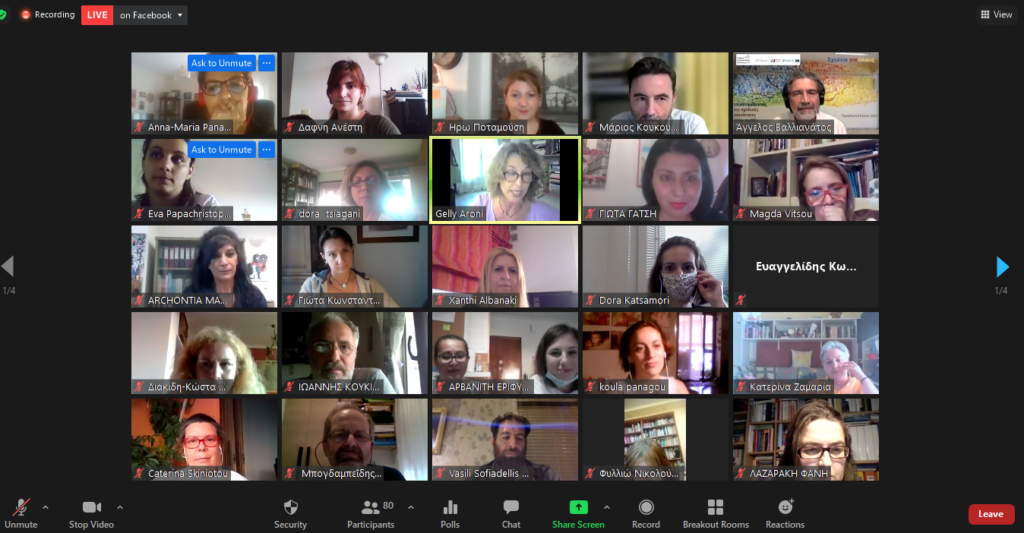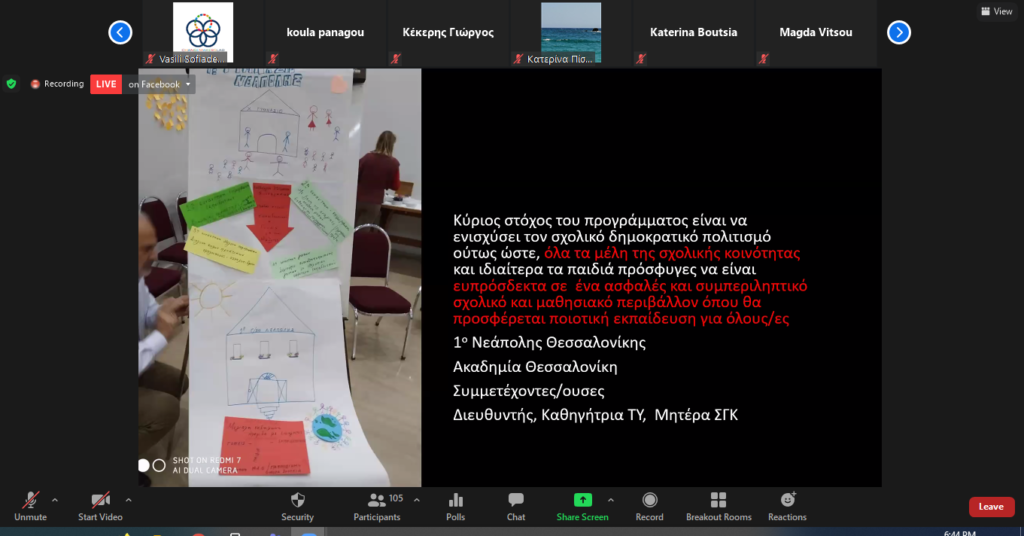Trainers from EWC’s Schools for All project in Greece presented several good practices for refugee education during the webinar “Supporting school communities in Practice” June 4, 2021.

The practice stem from the implementation of school action plans in 2019-2020.
Dora Tsiagani and Eva Papachristopoulou presented the creation of 25 multicultural – multimodal storytelling in four different languages (Albanian, Indian, Pakistani and Farsi) at the 1st Gymnasium of Avlona.
Students involved their parents in this activity, inviting them to narrate tales from their childhood which at a later stage transformed into multimodal texts using audiovisual tools.
The aim of this activity was firstly the creation of an inclusive school environment, where parents asked to have an active role, and secondly the acceptance and integration of each student’s native language in it. Schools have to encourage students to keep their native language alive, as part of their culture and identity, by giving them the chance and the place to make it to be heard and at the same time, by promoting a multi-language aspect as a part of its culture.
Open windows

Giota Gatsi presented the utilization of identity texts as a tool in inclusive activities that were implemented in the action plan “A school with open windows” at the 1st Gymnasium of Neapoli.
Identity texts mirror student identities and their multifacet characteristics in a constructive way, according to Cummins and Early. The trainer highlighted that in this way the students were able to cultivate and display their multiple skills rather than only focusing on the knowledge of language. At the same time, the barrier of the language was faced, as refugee students were encouraged to express themselves in their native language or even to find another way to be expressed through art.
Common activities, occasioned by the International Mother Language Day, were also organized in the school community, where all students were encouraged to draw the tree of the languages and left the same message in their native languages.
Cultivating “us”
Anna Maria Panagiotidou explained how the Evening Gymnasium of Kilkis worked collaboratively in groups applying the jigsaw method and how the notion of “us” was cultivated in the classroom during English class.
Using different ways, such as pantomime sketches and guiding posters, to overcome the language barriers and working in groups as per cooperative learning strategies, simultaneous interactions, positive interdependence, equal access and individual participation was allowed in the classroom, boosting cooperation. Adopting the jigsaw method, teachers tried to make students dependent on each other to succeed. So, students approach the knowledge from different, each time, aspects and at the same time, they feel as part of a group where the group assembles to complete the puzzle.
The tree of Blob
Archontia Mantzaridou explained how the activity “the tree of Blob” was used as a research tool, in the 5th High School of Chalkida, which was selected by the teachers as a suitable tool to display the current emotional status of the students. They asked their students to imagine that the blob tree is emblematic of their school environment and encouraged them to recognize themselves between the various blob characters, each of whom expressed a different feeling. Additionally, she explained how the school community explored the possibilities of integration and reflected on their action plan.
Panel of experts
The webinar focused on a combination of theoretical, short lectures as well as sharing good practices that were applied during the school year 2019-2020 by the participating schools. The webinar also featured a panel with the expert trainers of the project, Angelos Vallianatos, Iro Potamousi, Marios Koukounaras-Liagkis, and Geli Aroni as well as the valuable contribution of some of the Regional Trainers.
The discussion was moderated by the head trainer, Angelos Vallianatos, who presented the progress of the project and invited all speakers to contribute from various perspectives.
The experienced trainers explained the theoretical background and the working framework.
The whole school approach and the benefits of this methodology were analyzed in-depth by Geli Aroni.
Marios Koukounaras-Liagkis presented the tool of monitoring and evaluation of the school concerning the democratic culture, used in the project “Schools for All”. This tool facilitates the democratic transformation of an educational unit, as it describes the current situation and the changes it may need and could be undertaken to promote democratic culture.
Iro Potamousi presented in detail the steps of designing an action plan as a working tool, in which goals, actions, activities, and indicators of democratic culture are correlated, measurable results are sought, possible problems are assessed and a schedule is followed.
The discussion concluded with a brief reflection on the past year and the coming school year, with the “Schools for All” team expressing its enthusiasm to start working with the new schools.
Extended call
The call for applications for participation in the project has been extended for Gymnasiums and Lyceums until the end of September 2021. There seems to be a lot of interest, and many new schools are expected to join the network of “Schools for All”.
The webinar was well attended by an audience mainly of education professionals and primary and secondary school teachers, who had the opportunity to get familiarized with or enhance their knowledge on refugee education issues. The participants shared very positive feedback through the chat and the form they filled in at the end of the event as well as suggested topics that concern them for future respective trainings.
The 90-minute video of the webinar is available in greek on the EWC youtube channel.
“Schools for All” is conducted in partnership with the Hellenic Ministry of Education And Religious Affairs, in cooperation with the Institute of Educational Policy (IEP). The project is being implemented under the “Local Development and Poverty Reduction” programme in Greece, by the European Wergeland Centre (EWC), under the auspices of the Ministry of Education and Religious Affairs and with the support of the Institute of Educational Policy (IEP). The “Local Development and Poverty Reduction” programme in Greece, financed by Iceland, Liechtenstein and Norway, was awarded a total budget of 6,5 million euros as part of the EEA Grants 2014 – 2021. The program aspires to contribute to enhancement of social cohesion and reduction of economic and social disparities. The Fund Operator for the “Local Development and Poverty Reduction” programme in Greece is SOL Consulting S.A in partnership with Human Rights 360. More information here.